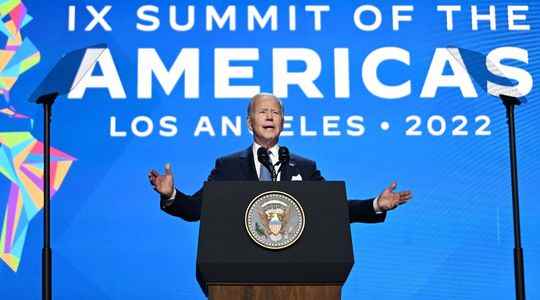It was one of the priorities of American President Joe Biden: to relaunch dialogue with Latin America on crucial subjects such as immigration, in particular after the clashes that marked the presidency of Donald Trump. But the “Summit of the Americas”, which ended Friday in Los Angeles, was marked by more friction than concrete announcements.
The event, which brought together representatives from twenty countries (Argentina, Barbados, Belize, Brazil, Canada, Chile, Colombia, Costa Rica, Ecuador, El Salvador, Guatemala, Haiti, Honduras, Jamaica, Mexico, the United States, Panama, Paraguay, Peru and Uruguay) concluded with the signing of the “Declaration of Los Angeles”. The text, which has no binding dimension, is based on four pillars: support for countries receiving migrants, new legal channels for foreign workers, a joint approach to border protection, including in the fight against smuggling networks and a coordinated response to historic flows across the US-Mexico border.
“No country should be left” alone in the face of growing population movements, hammered Joe Biden. The President of the United States said that “safe” and “legal” immigration benefits economic development, but that it is necessary to “protect the borders” against illegal entries, with “humanity”.
Regularization program for illegal immigrants
Concretely, Mexico will increase from 10,000 to 20,000 the number of people who can benefit from a specific work permit program. Canada will open its borders to 50,000 workers in the agricultural sector. Belize intends to launch a regularization program for illegal immigrants, while Costa Rica is going to renew a temporary protection program for people from Cuba, Nicaragua, or even Venezuela, from where 6 million people have left these five years to flee a particularly serious economic crisis. The White House, for its part, will release an envelope of 314 million dollars in humanitarian aid intended primarily for Venezuelan migrants. The United States also plans to welcome 20,000 refugees from Latin America in 2023 and 2024. That is triple the number of people welcomed this year, according to the American executive.
Joe Biden hoped to bring together leaders from across the hemisphere to show America’s strength and ability to pull together. But his refusal to invite several authoritarian dignitaries (Venezuela, Cuba, Nicaragua) prompted the heads of state of Mexico, Guatemala, Honduras, Bolivia and El Salvador to boycott the event. Cuba even convened a “counter-summit” on May 27 in Havana. “If they want to organize a meeting between friends, let them do it, but they can’t call it the Summit of the Americas”, proclaimed Bolivian President Luis Arce at the time. The American head of state thus experienced, on Thursday, a real moment of diplomatic embarrassment when the Prime Minister of Belize, then the Argentine president, criticized him in full plenary session about the absence of Cuba and Venezuela. .
China’s Shadow
For his part, far-right Brazilian president Jair Bolsonaro, with whom there is no shortage of friction, described his face-to-face with Joe Biden as “fantastic”. He also made conciliatory remarks on the environment, assuring that Brazil could develop its agriculture while preserving the Amazon. “We are the two largest democracies in the hemisphere. It makes sense for us to continue to work together and seek ways to deepen our partnership,” said Antony Blinken, calling the meeting “constructive.”
The stakes of this summit were numerous for the United States, which has seen its influence dwindle in its former backyard to the benefit of China, whose commercial dependence is becoming increasingly strong in South America. But the Biden administration has made it clear that it will not follow the lead of Beijing, which is investing heavily in the region through major infrastructure projects.
An anecdote has come to remind us of the omnipresence of China, whose name has been mentioned very little in Los Angeles – publicly at least. On the sidelines of the summit, the American Chamber of Commerce distributed a blue bag filled with gifts intended to promote American industry, containing among other things a water bottle and sunglasses… “Made in China”.
